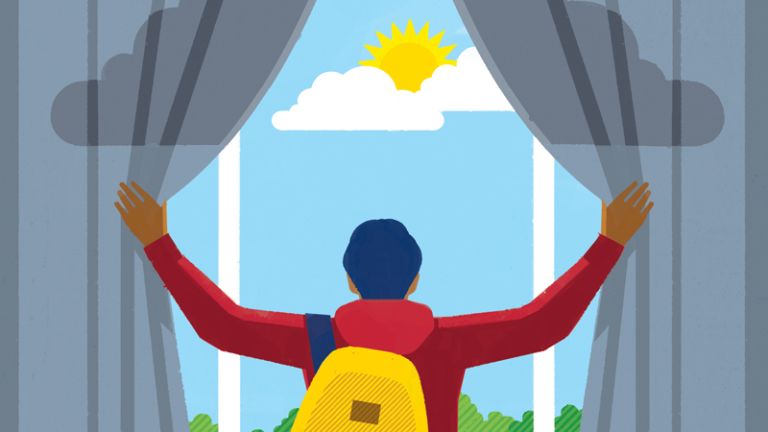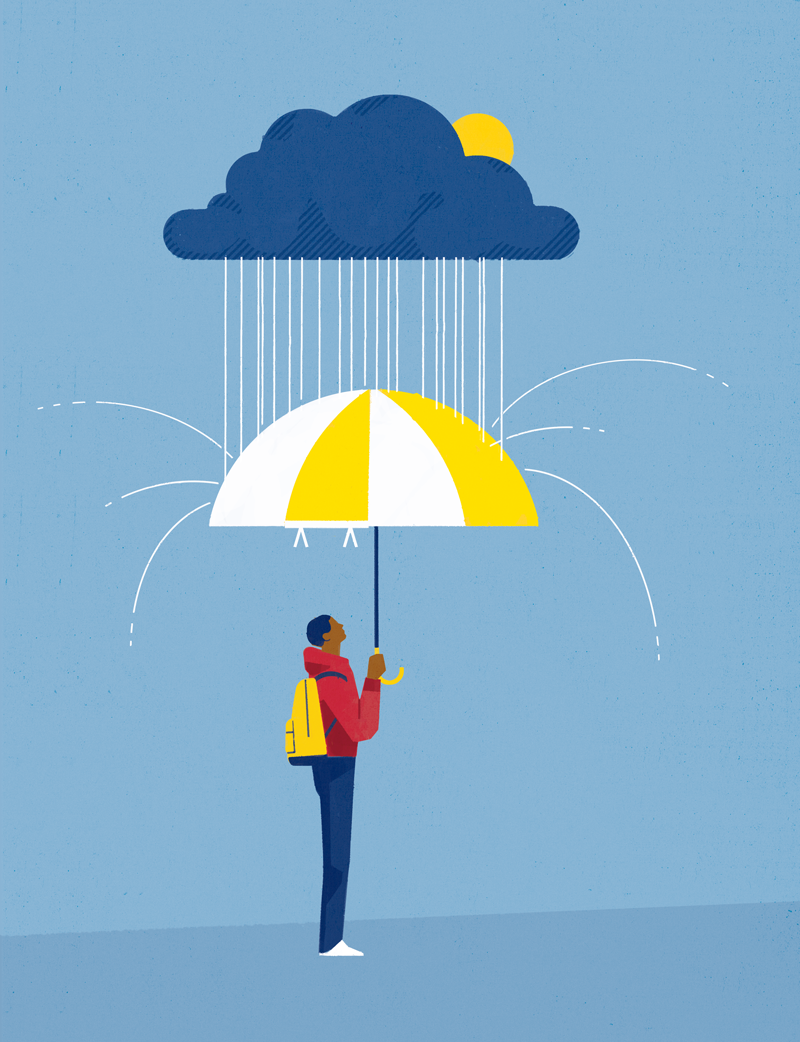
(Illustration/Chris Gash)
Helping College Students Thrive, Not Just Survive
At universities across the country, mental health issues are on the rise. Here’s how USC is helping.
When the first bout of severe depression hit Sara Bulthuis as a young teen, it felt like someone had slipped goggles over her eyes that made the world a darker place.
The high school freshman from Los Alamos, New Mexico, kept straight As and went out with friends, but she hid a secret. No one knew her appetite had disappeared. Every minor task required a monumental effort. That tiny voice inside that once encouraged her to pursue her passions had turned sinister.
“All of a sudden, that voice is not your friend at all. That voice is your worst enemy,” she says. “It’s telling you that you’re worthless, you’re no good, you shouldn’t get out of bed today. You feel like a burden to everyone around you.”
After her parents helped her find the right combination of therapy and medication, she felt better. But years later, during a study-abroad trip in Italy, the dark cloud enveloped Bulthuis once again, forcing her to return home early.
The experience left her worried about starting college at USC last spring. Now a sophomore, she hasn’t had a recurrence of severe depression, but she still feels uneasy about her well-being. She’s not alone. Thousands of college students face similar challenges. International studies show a third of incoming freshmen report having at least one mental health disorder, and anxiety and depression are among the most prevalent issues. A fifth of the U.S. population has a mental health condition, according to the National Alliance on Mental Illness, and most of these problems develop before people hit their mid-20s.
“People are now beginning to say what I’ve always suspected, that we have a mental health crisis in American higher education,” says Varun Soni, USC’s vice provost for campus wellness and crisis intervention and dean of religious life. “Every major research university is grappling with the same question: How do we change our culture toward one in which more people are thriving and flourishing?”
Attention on USC Student Mental Health Mounts
At USC, as at other universities, demand is on the rise for mental health care and supportive resources on campus as more students struggle with anxiety, clinical depression and, in some cases, even thoughts of suicide. USC leaders have taken note and are acting quickly with a renewed focus on student well-being.
It’s part of a collective mission of health promotion by administrators and staff at USC Student Health, USC Student Affairs and beyond. Initiatives are focusing on areas where students need help, such as efforts to decrease loneliness among freshmen and build connections and a sense of community among transfer students. Students themselves have started their own support networks, as well.
The commitment to student well-being has come alongside a major revamp of USC’s student health care services.
To ensure high-quality treatment for students who need care — whether physical or mental — the university’s medical enterprise, Keck Medicine of USC, assumed responsibility for clinical student health care services in 2017. Now all student-care physicians are members of the Keck School of Medicine of USC faculty, and all providers must complete rigorous credentialing and ongoing peer review, an important safeguard in the wake of allegations of misconduct by a gynecologist at the University Park Campus student health center.
In addition to addressing physical health problems among students, USC Student Health addresses mental health concerns through informal drop-in sessions with counselors and group and individual therapy. USC has hired 10 new mental health care professionals this year, boosting their ranks to around 30. That means fewer students will be referred to off-campus providers, especially those seeking mental health services for the first time.
These efforts all bolster the university’s goal to create a range of activities that encourage health and well-being across the college landscape — from classrooms to student organizations, from dining halls to labs.
“My hope is that students don’t just leave here with professional skills to flourish in their careers, but more importantly, that they leave with the skills that will make them successful in the art of living,” Soni says. “Gratitude, joy, compassion, wisdom, service — the things that science is now telling us make us feel like we led a life worth living.”

A New Champion of Student Health
In a major step forward in 2017, USC recruited Sarah Van Orman to champion student health. A nationally respected leader in the field, the board-certified physician emphasizes a comprehensive approach to addressing issues holistically across campus, instead of responding to problems one by one as they crop up. She strives to enhance communal well-being throughout the student population.
While leading student health services at the University of Wisconsin, Van Orman used that population-level approach to tackle issues beyond physical health care. Determined to address behavior like heavy drinking, she made sure police, educators, health officials and school administrators worked in concert, coordinating efforts across dozens of university offices. That strategy paid off: The campus saw excessive drinking and public intoxication plummet.
“We want students to leave here as healthy, curious and engaged global citizens,” says Van Orman, associate vice provost and chief student health officer. “To do that, we have to attend to all aspects of their humanity. All of these things — emotional connection, safety, curiosity, sleep, violence, substance use, inclusion — are intimately intertwined with one another and with academic success.”
That’s why she is enthusiastic about bringing in a mental health program for college students developed by The Jed Foundation, a nonprofit known for its proven public health strategies. The group helps universities analyze student mental health broadly and evaluate policies to ensure they are in tune with the needs of their student body.
The program’s first step involved understanding the extent of the mental health needs at USC. Last year, a campus-wide survey with more than 4,000 participants found that a quarter experienced clinical levels of depression, 10 percent had major depression and 7 percent considered suicide in the past year.
“That’s similar to other campuses, even a little on the lower side,” Van Orman says. “But having any student with suicidal thoughts is very concerning.” It’s especially troubling because the survey also revealed that only a third of students with mental health symptoms were receiving treatment of any kind. “We have a lot of students who could really use some help.”
However, results of the survey, the Healthy Minds Study, also offered hope. Half of the students indicated they are flourishing — measured by asking questions like whether they feel they lead a meaningful life, are engaged and interested in their daily activities and have an optimistic view of the future. And because these questions are scored along a continuum, it doesn’t mean students with lower scores are miserable, Van Orman says. “It simply suggests there may be opportunities through engagement, reflection, campus and community support and perhaps treatment for them to improve their mental health.”
The study’s findings have already led to change. USC is expanding its professional mental health counseling staff and developing a robust outreach campaign.
But treating serious mental health disorders is just one part of the equation. Many college students nationwide struggle with problems that don’t rise to the level of clinical diagnosis yet still profoundly affect their daily lives. They might worry about not meeting their family’s expectations or suffer from imposter syndrome, convinced they don’t stack up against their classmates.
“People are constantly thinking about their to-do list, constantly comparing themselves to others,” says Ilene Rosenstein, USC’s associate vice provost for campus wellness and education. “Those things have been very much linked to the risk of developing depression and anxiety.”
The race to achieve the traditional definition of success is a trend USC public health expert Amanda Vanni ’08, MPH ’09 has witnessed since she was an undergrad. The constant flood of opportunities to get involved in organizations and causes, internships and other extracurricular options is a blessing and a curse for many students.
“We see our peers and friends doing all these amazing things, so we feel that sense of pressure to perform or keep up,” she says. “This leads to feelings of being completely overwhelmed and exhausted and burned out.”
Now associate director of health promotion strategy at USC Student Health, Vanni builds campus partnerships to engage the university community in promoting health. She believes that student health is created in the spaces where students live, work and play, and that requires the investment and collaboration of everyone from senior leaders to academic advisors to faculty members.
“If we have healthier students, they are going to be more productive and likely to succeed in their classes and feel more connected to their community and USC,” she says. “The downstream effect is that they will be able to contribute to society and carry on these healthy habits later in life.”

Help is Here
For a struggling student, opening up about anxiety or other mental health challenges can feel overwhelming and intimidating. Many still think that asking for help carries a stigma — a misperception USC leaders are confronting.
The Healthy Minds Study found that more than 50 percent of participants felt they would be looked down on if they admitted to dealing with mental health issues. But only 7 percent said they would think less of someone who did the same.
“There’s a narrative here that you don’t tell people what’s going on, you don’t reach out for help,” Van Orman says. She is confident that students can develop the skills needed to change that belief.
Bulthuis says that on relatively rare occasions, she has felt stigmatized by other students. But she refuses to hide her diagnosis of clinical depression. She wrote her college admission essay on the topic and plans on being open with future employers. “It does concern me, but in the long run, it’s important for me to find a company that recognizes I have these problems and is going to support me,” she says. “In some ways, it has shaped who I am, but it doesn’t define me.”
Others feel less comfortable sharing their struggles. Jane Jones, a senior at USC who asked to use a pseudonym to protect her identity, has dealt with anxiety and obsessive-compulsive disorder, or OCD, since childhood. She worries that being too open about her condition will hurt her job prospects. “I know it’s important to raise awareness, but right now I wouldn’t post on Facebook about all the types of irrational thoughts OCD has given me,” she says. “Employers go online, and I don’t want that to be the first thing they see about me.” She also fears that people will view her as incompetent or unable to handle life’s ups and downs. “That isn’t true. You can have these issues and still be very functional.”
Jones is living proof. Beyond carrying a heavy course load, she is involved in extracurricular activities, has worked a campus job and completed several internships. But at the end of sophomore year, her anxiety reached a breaking point. She started having more unwanted and disturbing thoughts. While driving, she worried about losing control and hitting someone. After bumping into a person passing on the sidewalk, she fretted for hours that she had hurt him or knocked him into the street. She incessantly scanned her emails before sending them to her boss, convinced she had inserted something inappropriate.
She eventually confessed her struggles to her mom. Together, they found a specialist who helped her. “I’m still on an uphill battle,” she says. “It’s not perfect. I don’t think I’ll ever be 100 percent free of anxiety, but at least now I have the tools to check in every day and make sure I’m being kind to myself.” Jones is cautiously optimistic about USC’s efforts to bolster its mental health care resources. She used the university’s services before the recent changes, visiting a counselor at the Engemann Student Health Center several times as a freshman. But it didn’t resolve her issues. When she returned later for more support, she was referred to services off campus. Bulthuis had a similar experience, and the only agency that fit her schedule and was covered by her insurance was in Pasadena.
Having to travel to seek help can be a roadblock for college students, Bulthuis says. “When you are struggling, it’s hard enough to get up and walk across campus to the health center.”
USC aims to change that by continuing to hire more mental health care professionals to limit off -campus referrals. Van Orman says she expects the latest boost in hiring to reduce referrals to outside providers from 70 percent to 30 percent.
She also instituted a new program called Let’s Talk, in which counselors hold informal drop-in sessions around campus. Students don’t need an appointment.
And when student health physicians assess patients for medical problems, they also watch for stress or anxiety. If they spot a warning sign, they walk the student over to speak with a counselor.
If we have healthier students, they are going to be more productive and likely to succeed in their classes and feel more connected to their community and USC. The downstream effect is that they will be able to contribute to society and carry on these healthy habits later in life.
Amanda Vanni
“That type of program is very useful for students who have stigma around seeking care for a mental health concern,” Van Orman says.
Other initiatives outside the realm of professional counseling and mental health also help the university community. Through Mindful USC, thousands of students, professors and other employees are developing meditation skills to cope with stress and anxiety. The program’s free mobile app can help users relax and refocus. Additional campus resources include free yoga and tai chi courses, spirituality-based programming and therapy dog visits.
Continuing the Conversation
Recent graduate Marina Hrovat ’18 is encouraged by the new services. When she was a resident assistant and USC Undergraduate Student Government’s wellness affairs director, she saw some students falter under the weight of a full social life and rigorous academic demands.
It inspired her to begin developing a course about well-being intended for all incoming students at USC, an idea embraced by university leaders. The “Thrive: Foundations of Well-Being” course covers topics like building community at USC, managing time and learning to succeed through failure. An initial pilot test with 29 students last fall earned high praise.
“It helped me figure out what success and happiness means to me, and what longterm goals will help create a future that is meaningful to me personally,” says Debbie Lee, president of USC Undergraduate Student Government. “I think it will be valuable for many USC students.”
Senior Rassim Chettfour found it freeing to be vulnerable with his classmates without worrying about being judged, describing the weekly discussion sessions on topics like spirituality and identity as a life-changing experience. They helped him feel more comfortable sharing his personal challenges.
“We created this space where we could all be open,” he says. “There’s a richness and underlying comfort that comes with that. It’s something I want to emulate for the rest of my life.”
Student feedback is shaping the second offering of the course this spring. USC plans to make it broadly available to students in the fall. That progress gives Soni confidence that the university is moving in the right direction. “We’re trying to create global citizens who are engaged, who are leaders, who will change the world,” he says. “That’s what people who are thriving do, and that’s our goal here at USC.”



